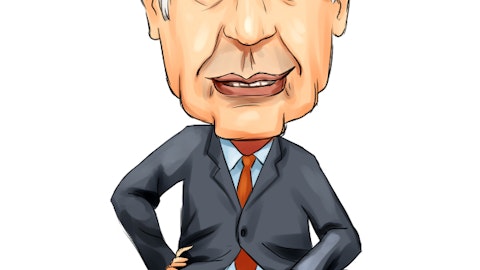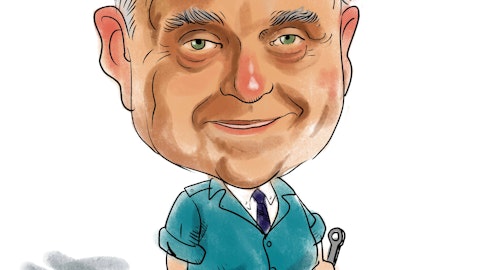Mariner encourages hedge fund community to adopt UN PRI (Risk)
Mariner Investment Group has become one of the few US hedge funds to adopt the UN principles for responsible investment. CEO Bracebridge Young thinks other funds should take up the standards Global alternative asset manager Mariner Investment Group has signed the United Nations principles for responsible investment (UN PRI), becoming one of the few US-based hedge funds to adopt the accords. Mariner Investment Group, founded in 1992, together with its associated advisers consisting of several direct and affiliated single and multi-strategy hedge funds, funds of funds and other alternative investments services, manages approximately $10 billion of assets.

ValueAct Hedge Fund’s Big Microsoft Bet Is Paying Off So Far (Forbes)
When Jeffrey Ubben’s ValueAct Capital Management disclosed its $2 billion position in Microsoft Corporation (NASDAQ:MSFT) +4.2% in April, it seemed like the activist hedge fund could be in over its head in trying to shake things up and bring change to the long-languishing Microsoft. Ubben was betting a big chunk of his hedge fund’s $12 billion under management, but it was a tiny stake in the software giant amounting to 0.8% of the company’s shares. But Ubben made his presence felt in Redmond, Wash., pressing other shareholders and potentially threatening a proxy battle. By Labor Day weekend, ValueAct appeared to have played a role in long-serving Microsoft CEO Steve Ballmer’s decision to quit within a year.
Long/short opportunities flow to next level (eFinancialNews)
As most of the older, household names among the European long/short community have stopped accepting new money and become more global in their approach, investors are looking further afield to the next generation. Eighteen months ago things were very different. Equities hedge funds were coming off the back of an average loss of 8.38% in 2011, according to data provider Hedge Fund Research, with many brand names down by double digits. There was a question mark over the future of the euro and markets were driven by announcements from central bankers and policymakers. Some investors were questioning whether the fundamental stock-picking skills that these managers rely on could work in risk-on risk-off environments.
US Hedge Fund and Banker Bonuses to Jump 10% in 2013 (IBTimes)
US hedge fund and banker bonuses are set to rise by 10% in 2013 but there is still a pay disparity between different business sectors on Wall Street, says a consulting firm. According to a fresh forecast by Johnson Associates, overall individual US banker bonuses may rise by 5% to 10% in 2013, compared to last year. The consulting firm says that while bonuses, on average, will rise, some areas of finance will recieve much more than others. Underwriters are set to receive a bonus rise of 10% to 15% while prime brokerage and private equity workers are likely to see a 5% to 10% jump in extra pay.
Will Twitter IPO pop? Hedge funds weigh in (CNBC)
The financial community will be watching whether the so-called smart money invests in Twitter’s initial public offering. Anecdotal evidence suggests some larger hedge funds are at least showing interest. Representatives of Dan Loeb’s $14 billion Third Point and multi-billion-dollar family office Soros Fund Management took meetings with Twitter executives in New York City last week, though it’s unclear if either put in for a stake, according to people with knowledge of the meetings. And Samlyn Capital, a hedge fund that managed about $3.4 billion as of July, was among the firms requesting to invest in the new stock, according to a CNBC source. All three firms either declined to comment or did not respond to a request.
Endowment Fund Said to Seek Secondary Buyers After Redemptions (SFGate)
The Endowment Fund, a vehicle mimicking the strategy of institutions such as Yale University, is seeking bids for a portfolio of private-equity and hedge-fund stakes valued at $1.8 billion to offer shareholders liquidity, three people familiar with the matter said. The fund hired Park Hill Group LLC, the placement-agent unit of New York-based The Blackstone Group L.P. (NYSE:BX), to contact secondary buyers about the portfolio, said the people, who asked not to be identified because the information isn’t public. Shareholders withdrew more than $1 billion from the fund last year as of late October amid lackluster returns. Houston- based Endowment Advisers LP, the fund’s adviser, decided at the time to block client redemptions and instead return 5 percent of assets by Dec. 31.
Hedge fund Elliott builds up 12 percent stake in Celesio (Reuters)
Hedge fund Elliott International has built up a stake of almost 12 percent in German drugs distributor Celesio (CLSGn.DE), currently the subject of an $8.3 billion takeover bid by U.S. rival McKesson Corporation (NYSE:MCK). Elliott owned 11.68 percent of the shares in Celesio on October 31, according to a stock exchange filing on Wednesday. Elliott, run by U.S. investor Paul E. Singer, has a history of building up stakes in takeover targets with the aim of extracting a better price, such as with Kabel Deutschland (KD8Gn.DE) just a couple of months ago.
All eyes on Twitter’s IPO: $26 per share (CNBC)
State Street Wins Best Hedge Fund Administrator and Best Risk Management Technology Provider of the Year Awards (WSJ)
State Street Corporation (NYSE:STT), announced today that it has been named 2013 Hedge Fund Administrator of the Year and 2013 Risk Management Technology Provider by HFMWeek magazine. The HFMWeek US Hedge Fund Services Awards recognize outstanding service and support to the hedge fund industry in North America and are judged by an independent panel of experts. “The HFMWeek awards further validate the focus State Street places on solutions for our hedge fund client base,” said George Sullivan, executive vice president and global head of alternative investment solutions (AIS) at State Street. “Our clients face a complex and evolving regulatory environment, so end-to-end solutions that help monitor and manage risk are becoming increasingly necessary.”
British Pensions Increase Hedge Fund Investments (Finalternatives)
British corporate pensions added billions of pounds to their hedge fund investments last year, according to a new report. U.K. pension schemes had £58.2 billion invested in hedge funds at the end of March, according to the Pension Protection Fund, a government agency. That’s £12 billion more than the at the end of March 2012. The report does not indicate how much of the increase was due to inflows, and how much to performance. But with hedge funds gaining in the mid-single digits last year, a substantial amount of the gain is likely new capital.
SFOs Put Squeeze On Hedge Fund Fees (FA-Mag)
There are more single-family offices than ever before and on average they’re controlling larger pools of assets. Hedge funds are a core investment option for many of them. However, while some hedge funds are performing as “promised,” many others are not. This has caused consternation among family office investment officers, who are responding by taking a variety of actions. While they certainly haven’t abandoned hedge funds, they’re changing how they select and monitor these funds, according to a survey of 71 single-family office executives who have allocated about $800 million to hedge funds. Close to half the family offices surveyed are domiciled outside the U.S.
Roubini says central bankers have a tough choice: Kill recovery or risk bubbles (Marketwatch)
Regulations meant to curb risks in the global financial system –known to economists as “macroprudential regulations” — had better work, or central bankers will be between a rock and a hard place. In the aftermath of the financial crisis six years ago, unconventional tools like quantitative easing and zero-interest rate policies may have sparked an economic recovery but not one of turbocharged growth or low unemployment. That puts policy makers in a difficult position, NYU economist Nouriel Roubini wrote in an opinion piece at Live Mint on Wednesday.
Everest, Passport and Others Reconsider Emerging Markets (InstitutionalInvestorsalpha)
John Burbank III, the founder and CIO of Passport Capital in San Francisco, was once an emerging-markets bull who invested heavily in companies that stood to profit from China’s rapid industrialization. “Be long what China is short” is how he describes his $3.8 billion macro fund’s biggest investment theme of 2010 and 2011. That meant go long gold and resources as well as commodity producers. But in the past two years he has reversed course. “For the most part, the emerging-market growth story is over,” says Burbank. Passport’s portfolios now reflect his new beliefs: Industrial growth in China has played out as an investment theme, but it’s time to buy into the rising consumer and service sectors in China and other emerging markets.
Lisa Marie Falcone cleared of drunk driving, drug charges (PageSix)
Drunken driving and drug charges have been dropped against Lisa Maria Falcone, the socialite wife of embattled hedge fund billionaire Phil Falcone. The Suffolk County D.A.’s office this week said it will not proceed with its case against Lisa, who was arrested for driving while impaired and without a license following a Labor Day crash last year. Lisa was cleared of DWAI (driving while ability impaired) after toxicology tests showed she hadn’t been drinking and had only a trace amount of prescription meds in her blood. We’re told, “She is relieved because she wasn’t drinking and driving.”
Recommended Reading:
Roumell Again Reduces Position in Transcept Pharmaceuticals





